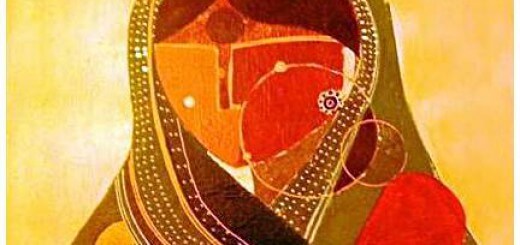Translation of Tulsidas’ Ramcharitmanas. How does one tell a saint from those who are not?
Tulsidas was a Hindu poet-saint, reformer and philosopher renowned for his devotion for the god Rama. A composer of several popular works, he is best known for being the author of the epic Ramcharitmanas, a retelling of the Sanskrit Ramayana. (Wikipedia)
“The praise of saints – sing scriptures do
And just now did – you praise them, too
With your own lips, said – ‘Love I them!’
The signs of saints – so tell me then
I wish to hear – what makes a saint,
And who be knaves?” Then Rama spoke.
“Now hear – what makes them saints, my kin
As Books countless and scriptures sing
On saints – bad folks operate as would
An axe, O kin – cuts sandal wood
Its fragrance then – the axe perfumes
The sign of saint – likewise, subsumes.
That’s why its paste would grace foreheads
Of gods, in such contrast – to axe
Who earns just flames – red-hot, intense
And hammered hard – for all its wrongs
Saints hanker not – to please mere sense
Amiable, they are – at peace, intense.
Saints grieve to see – anyone’s distress
And at one’s joy – rejoice no less
To all, they’re fair – not enemy-like
No vanities – no passions bite
Not greed, nor anger – fear-joy part
They have such tenderness of heart!
Compassion for – distressed ones, all
In every word – they speak, the call
For Lord, selfless – devotions flow
And so in thought – in deeds, which glow
Respect they give – but seek not same
Such souls, more dear – than life my own!
Though full of wit – they’re passionless
Have hearts humble – in nobleness
Just so they are – to Lord they proffer
Tranquil are they – no motives offer
Forever then, learn – who true saint is
Placid, no guile – friendly, at ease!
In feet of Lord – their faiths reside
Are fountains they – of virtues, wise
They swerve not from the steady hold
Their minds rule sense – in dharma’s fold
No cruel thoughts – good conduct such
Harsh words will bounce – nor praise can touch!
And seek they not – material want
Lord’s lotus feet – make glad their heart
Note kin, how much I love them more
Than life, their kind – that saintly core
And how so well – in body, they
All virtues and – true bliss, portray!
Now hear too, kin – of knaves who be
Eschew for sure – their company
For woe it brings – to one, to all
Like apple bad – good apple will spoil
When others gain – their fortunes thrive
In hearts of knaves – angers contrive.
Knaves get so glad – if others downed be
Like found on road – a treasure free
Senses drive them – with arrogance
In anger and – in greed they dance
Merciless and – deceitful too
Offensive and – impure too, true!
For no reasons – like enemies feel
Of even folks who – bear goodwill
They lie, and lie – they thrive in lies
Have lies for snacks – main course is lies
Sweet sounds, like peacock – though they make
Note kin – that bird’s peculiar take!
Peacock, unflinching – will partakeMove to Bin
For lunch – the most venomous snake!
Vile are the knaves – for women, lust
And wealth ill-gotten – grab they must
Pure devils, yet – in man’s mere shape
But what is it – they really drape?!
In greed they wrap – in greed they sleep
They think not once– tryst Yama will keep!
They sigh when meet – exalted folks
Like fever high – in anger gross!
By chance when they – distressed ones see
Get joyful like – ruled world for free!
Selfish they stay – selfish they grow
All friends they lose – all kins too go
Greedy, selfish – have tempers such
Not parents, teachers – heed they much
Nor priests they heed – not feel the need
Are passions’ prey – and malice breed!
Selfish, they bring – just ruin, to rest
And heed not words of saints – God’s best!
Oceans of vice – sinful, dull tone
Detest they Books – grab wealth not own
Malice although – to all they show
Of saints¬, they be – such special foe!
Pretense at heart – falsities within
And, on outside – show holy sheen
Those vile, vile ones – those wicked ones
In Satya and Treta yug – none
In Dwapar, few – they sprinklings make
When Kali yug comes – they come full wake!
Then teem they do – in large, large droves
In Kali’s Age – their wicked hordes!
The wise ones know – what I tell you
So Vedas say – and Puranas, too!
Good virtues do – benevolence retain
No sin as bad – as causing pain!
For those who do – such pain inflict
On human life – such precious gift!
On others, then they – too must bear
Those pangs of pain – of birth, death, fear
The selfish ones – whom passions rule
Do motley sins – and ruin, like fool,
Their value in – next world, undone,
Then I, to them – as Yama come
And fruits they get – for actions had
Be evil those – or good, so sad
This, wise ones know – and so they do
Place love in Me – not want those who,
That pain of birth – of death, in turn
And skip acts good – or bad, they learn
And just in Me – shelter they gain
Be priests, be chiefs – be gods, be men
When grasp this they – their cycle ends
And kin, maya – it grief appends.
As life and death – turn round and round
So signs of saints – of knaves, are found
True virtue – see not just one, do;
As vice – and as those virtues, too
In body same – do both survive
Ignorant ones – see just one thrive!”
[Notes: (1) Enhanced and updated from an earlier version published in www.desicritics.com. (2) The paste of sandalwood is frequently used to decorate the foreheads of temple idols – hence the reference to “foreheads of gods”. (3) Satya yug, Treta yug, Dwapar yug, and the (present day) Kali yug are the four epochs (yugas) of time per Hindu mythology, occurring in that sequence. (4) Yama, also known asYamaraja, represents the god of death.]







![Kuch Ishq Kiya, Kuch Kaam Kiya [Ishq Aur Kaam] - Faiz Ahmed Faiz](https://www.ravimagazine.com/wp-content/uploads/2015/03/faiz-461x245.jpg)





